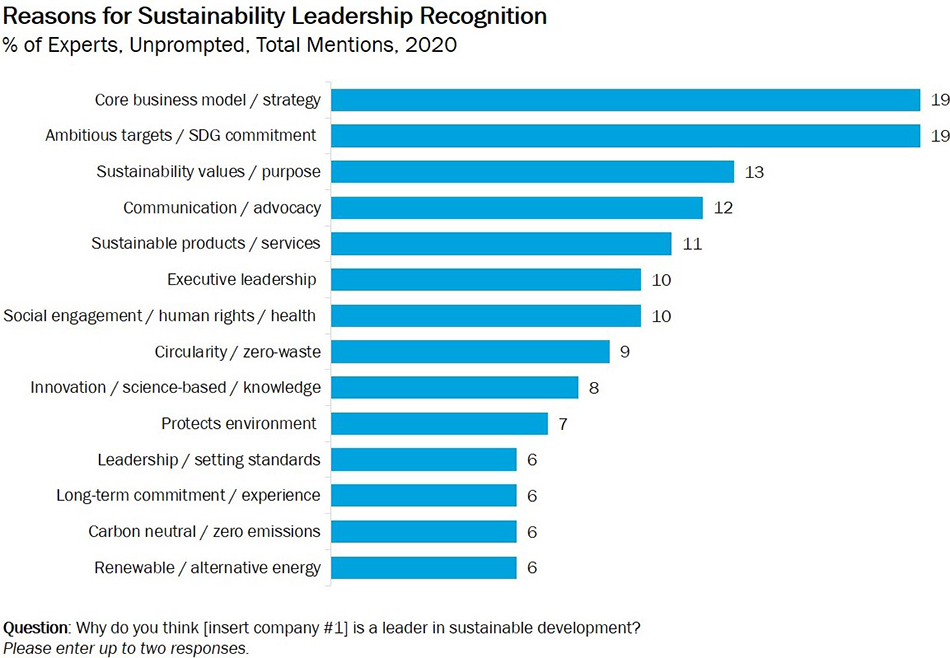Corporate sustainability leadership during a pandemic
Tove Malmqvist
Mon, 11/02/2020 – 01:00
As we continue to grapple with the COVID-19 pandemic and its devastating social and economic effects, companies are continuing their efforts to become more sustainable — and some are being recognized for their efforts.
The 2020 Sustainability Leaders, a GlobeScan-SustainAbility survey of experts worldwide, reveals which companies are perceived to be leaders on sustainability during this challenging time by sustainability professionals representing business, government, NGOs and academia. Over 700 experts were surveyed online across 71 countries in May.
Results show that Unilever continues to dominate as a recognized leader among the sustainability community, securing the leading position for the 10th year in a row, with Patagonia and IKEA following in the second and third spots, respectively.
Data from the survey indicate that corporate sustainability leaders need to navigate an increasing sense of urgency for almost all sustainability challenges. At the same time, about half of experts fear that the impact of the current pandemic will deprioritize the sustainability agenda over the next decade.
While environmental issues such as climate change, biodiversity loss, water scarcity and water pollution dominate the list of issues that experts say are the most urgent — these are all considered more urgent than they were in 2019 — the perceived urgency of social issues is also on the rise. Experts express significant increases in concern about poverty, economic inequality and discrimination, and growing attention is also given to accessibility of needs such as education, food and energy.

Although the issues we are facing are becoming more urgent, most experts believe that the pandemic will have a negative impact on the sustainable development agenda over the next 10 years, potentially making the transformation to sustainable business much more challenging. The pandemic and its economic aftermath are expected to further exacerbate inequalities and poverty, emphasizing the importance of the social aspects of the sustainability agenda.
However, almost a third of experts also believe that the pandemic will lead to a renewed focus on environmental issues, and some point to shifting supply chains and changes in consumer behaviors and travel as potentially positive outcomes.

In this challenging context, experts in North America as well as globally continue to recognize the efforts made by Unilever to advance the sustainability agenda. Unilever has dominated perceptions of sustainability leadership among sustainability professionals for a decade, but there are some signs that the leadership landscape may be beginning to shift. At the global level, four new companies enter the list this year: Microsoft; Ørsted; L’Oréal; and Tata.
North American experts’ views on which companies are leaders largely line up with the global average, although recognition of both Unilever and Patagonia is even stronger among this group. Experts based in North America also recognize additional North American-based companies as top-tier sustainability leaders, including Mars, Nike, Walmart and Maple Leaf Foods.

While having sustainability as part of the core business model continues to be a major factor of recognized sustainability leadership, setting ambitious targets and committing to the United Nations Sustainable Development Goals are the top issues in the eyes of experts.
As we confront a global pandemic and the economic hardship it is producing, efforts around communications and advocacy alongside health, social engagement and human rights have become increasingly important criteria as well.

In order to increase resilience and their ability to withstand future systemic shocks, businesses are first and foremost expected to double down on their ESG commitments. Beyond ensuring business continuity and risk preparedness, the private sector is encouraged by experts to take far-reaching action by rethinking business models, transforming supply chains and focusing on lowering GHG emissions.
Collaboration and partnerships with governments are also pointed to as urgent actions that companies should take to build resilience.

The findings of this 2020 survey make it clear what the private sector must do to increase resilience and the ability to withstand future shocks in the wake of COVID-19: embed environmental sustainability and ESG in strategy, develop new and sustainable business models, improve risk management and business continuity planning and transform supply chains. The time to act is now.
Public Opinion
